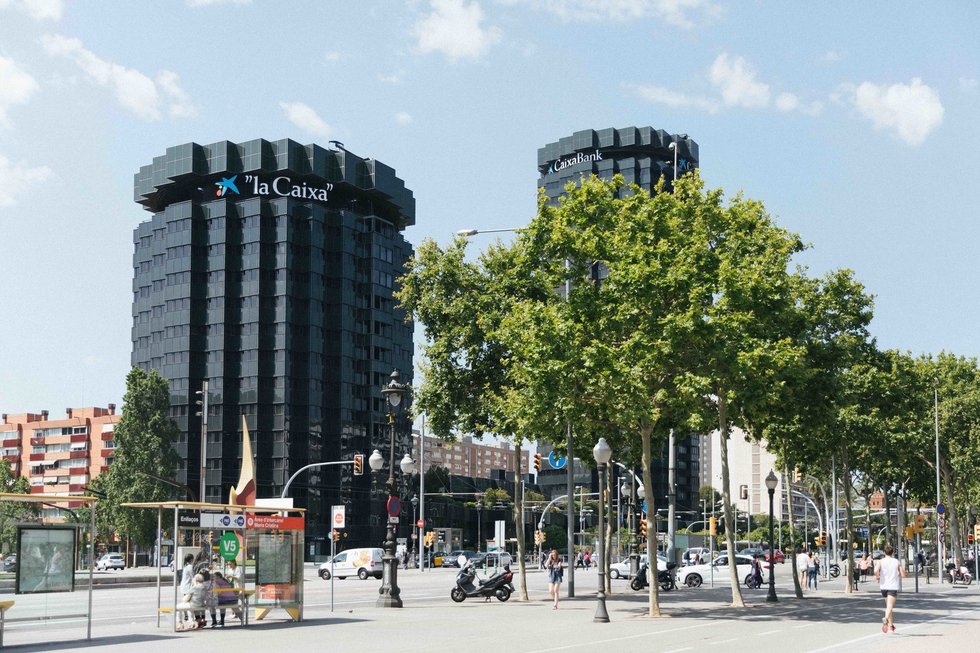Working in Finance in Post-Crisis Barcelona: What You Need to Know
13. 11. 2019
6 min.


I’m an American expat who has been in Spain for 7 years while teaching English, writing and traveling.
Barcelona is the backbone of Spain’s economy and one of its pivotal centers of business, finance, and commerce. As the country continues on the road to recovery from its recent economic crisis, job opportunities in the financial sector are becoming more plentiful, especially in the Catalan capital. If you’re thinking about relocating to sunny Barcelona to work in this dynamic and fast-paced field, here’s why now is the perfect time to jump on board.
What’s Been Happening
Recovering from the crisis
Spain is currently bouncing back from a financial crisis that lasted from 2008 through 2014. The Great Spanish Depression, as it became known, began during the 2007-2008 global financial crisis, and was exacerbated by the giant housing bubble the country was experiencing. This led to a nosedive in construction and sales, especially in Catalonia, which experienced a massive 42.2% drop in sales. Paired with a skyrocketing but unsustainable GDP rate, economic collapse followed in 2008.
Banks had lent a substantial amount of money to real estate companies during this time, and it was also discovered that there had been widespread malpractice in the sector as well. With the economy on the decline, many banks found themselves in debt, and a large number of their employees lost their jobs. By March 2012, unemployment across all sectors was 24.4%, double the average in the EU, and millions were left without work.
Despite these hardships, Catalonia has worked hard to recover from the crisis, and the unemployment rate has been steadily decreasing ever since. Barcelona is only second to Madrid when it comes to demand for jobs in finance. Additionally, in recent years, Catalonia has proven itself to be a leader in the IT field in the country, which has resulted in a need for financiers to work on projects in this area. Since 2017, more positions have opened up in finance in the region than ever before, which has been coupled with increases in salary.
Last summer, the commercial real estate services firm JLL reported that Barcelona’s finance sector has gone through a transformation since the economic crisis, which has included restructuring, strengthening, and the implementation of policies to control risks and balances. This means that banks have seen much improvement in the job market in the sector’s main areas: credit institutions, securities agencies, and insurance companies and pension funds.
Since 2017, more positions have opened up in finance in the region than ever before, which has been coupled with increases in salary.
Fintech, a division on the rise
The financial sector is seeing growth in a key area: fintech. A combination of the words “financial” and “technology”, this term describes the application of technology and digital innovation, as well as the provision or improvement of financial services. It’s a branch that comprises both start-ups and existing financial institutions, and even if you think you haven’t heard about it yet, many of its innovations are already well established, such as mobile banking apps, crypto currencies, and peer-to-peer payment services.
Barcelona has become something of a hub for start-up fintech companies, particularly those whose technologies are considered likely to disrupt the more traditional financial services. The level of innovation is reflected in the diversity of companies becoming established in the city, from bnc10, a 100% digital bank (otherwise known as a neobank), to Kantox, a peer-to-peer finance platform.
Education
One of the major advantages that Barcelona has in the financial sector is its top-notch universities and business schools that attract talented students from around the globe—the Barcelona Graduate School of Economics, ESADE, and the Barcelona School of Management, to name just a few. The latter offers a master’s degree in banking and finance that can put you on the fast track to success in Barcelona. Focused on risk assessment, how to make strategic decisions, and the global banking framework, it offers any candidate a leg-up when searching for a job in this sector.

Where it’s at
There are three main centers of economic activity and finance in Barcelona: 22@, Parc de l’Alba, and Delta BCN/BZ Barcelona Innovation Zone. Together, they are referred to as the Barcelona Economic Triangle.
22@ is famous in Barcelona for being a hub for start-ups in technology, the web, and innovation. Parc de l’Alba in Vallès, just northwest of Barcelona, houses facilities including the UAB Research Park, the ALBA Synchrotron, and various other science and technology companies. The Delta BCN/BZ Barcelona Innovation Zone is located in Llobregat, directly southwest of the city. This area is a hotspot for several sectors, including mobility, health, media, and aerospace technology. Together, the Economic Triangle helps to generate thousands of jobs and revenue to keep the economy stimulated and growing.
However, even without a single defined hub in Barcelona, finance is bustling along the city’s busiest streets.
Stocks and trading
For the hub of activity when it comes to stocks and trading, head straight to the Bolsa de Barcelona. This stock exchange is located in the L’Eixample district, right on the prominent Passeig de Gràcia. It has 19 members who, between them, represent securities companies and agencies, as well as credit entities, and uses the best technology available to facilitate its Interconnected Stock-Market System. This detailed report outlines the Bolsa’s activity and information for 2018, including its members, gains, and tax and trading facts.
Banking
Many of the city’s banks can be found on Avenida Diagonal, which stretches all across Barcelona. This is an excellent place to start the job hunt when it comes to banking and finance. The headquarters for both Banco Sabadell and CaixaBank, two of Spain’s largest banks, were formerly located in the Les Corts neighborhood on Diagonal, but have now relocated to Alicante and Valencia respectively.
What to Expect
With Barcelona being such a well-known city to study business and finance in, and with more and more organizations requiring new talent, there’s never been a better time to start on this career path here. Job sites such as Glassdoor, JobFluent, and LinkedIn, as well as Welcome to the Jungle, are constantly advertising new positions, many of which need to be filled by candidates with a high level of English or knowledge of other languages. As Barcelona is quite an international city, the more worldly the candidate is, the more attractive they are going to be.
As Barcelona is quite an international city, the more worldly the candidate is, the more attractive they are going to be.
Positions that are in high demand at the moment include finance analysts, finance managers, finance assistants, accountants, and business analysts. Many new start-ups, especially in technology and healthcare, are looking for fresh faces.
Salary range
A worker in the financial sector in Barcelona can expect an average yearly salary of €33,000, plus bonuses—an attractive figure compared with what’s happening in other fields in the city. This isn’t specific to any one role, but is taken across all positions and levels of experience in the sector, according to Glassdoor. Payscale.com, meanwhile, indicates that a financial analyst at the beginning of their career can expect an average annual salary of €30,248, plus bonuses. And many who work in this role report wages increasing to as much as €60,000. To get a better idea of specific salaries for various roles in finance, check out this report by Salaryexplorer.com.
Even though salaries, on the whole, are lower here than in other European hubs, workers choose to make the city home because of its vibrancy and the Mediterranean lifestyle. Raúl Peñas is an operations controller for a group of retail traders in Barcelona, and finds his job interesting because of the variety of tasks he performs. “Apart from analysis of sales and margins, I take part in developing software tools in order to supply the most accurate information to sales and management teams,” he says. He’s been here for about nine years, having previously held finance roles in other European cities, and can’t imagine working anywhere else now. “In Barcelona you can find the dynamism and competitiveness of any northern European city, but there’s also the beautiful and sociable atmosphere,” he continues.
“In Barcelona you can find the dynamism and competitiveness of any northern European city, but there’s also the beautiful and sociable atmosphere.”
And Spaniards know that it’s essential to find that sweet spot between your personal and professional life if you’re going to succeed long-term in your career. Compared to other top European financial hubs, such as London, Zurich, or Frankfurt, Barcelona offers a lower cost of living, a more relaxed pace, and more agreeable weather.
The Takeaway
With the economy bouncing back and being stronger than it’s been for the past decade, now is the perfect time to start your career in finance in Barcelona. With new positions opening up every day in start-ups and well-established companies, qualified, talented candidates are in high demand to join this fast-paced and exciting sector. Find out for yourself why so many choose to live and work in Barcelona and jump-start their careers in business and finance!
Photos: WTTJ

Viac inšpirácie: Work in Barcelona
Moving to Barcelona for work? Navigate the job jungle in this international hub with our insider tips, advice from locals and insights from industry experts.

Work in Barcelona: François
Originally from Belgium, he left his job at Google in San Francisco to move to Barcelona with his wife, where he decided to open his own bakery.
11. 12. 2019

Work in Barcelona
Considering relocating to Barcelona? Let’s have a look behind the scenes to understand what it takes to be a happy expat in Barcelona.
11. 12. 2019

Work in Barcelona: Amy
Born and raised in Canada, Amy moved to Barcelona to change career by retraining as a software developer. Here's her expat experience of the city.
11. 12. 2019

My Barcelona: ‘The city is so much richer than it seems’
For Anaïs, Barcelona is such an enticing city that she has made it her home not once, but twice.
13. 11. 2019

My Barcelona: ‘It’s the Silicon Valley of Europe’
Frenchman Erwan Riou originally qualified as an architect, but after a stint in Brazil, the 33-year-old started retraining as a programmer...
13. 11. 2019
Novinky, ktoré to vyriešia
Chcete držať krok s najnovšími článkami? Dvakrát týždenne môžete do svojej poštovej schránky dostávať zaujímavé príbehy, ponuky na práce a ďalšie tipy.

Hľadáte svoju ďalšiu pracovnú príležitosť?
Viac ako 200 000 kandidátov našlo prácu s Welcome to the Jungle
Preskúmať pracovné miesta